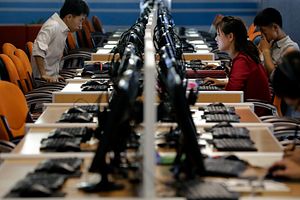In the past, if you wanted to get a degree or certificate, or just learn something new, you needed to physically attend classes. But this is not the case anymore as the online learning revolution has started.
The global e-learning market was worth $165.21 billion by 2015 and is expected to reach $275.10 billion by 2022, growing by around 7.5 percent each year during the forecast period, according to a report by India-based research firm OrbisResearch.
The report cited flexibility in learning, low cost, easy accessibility, and increased effectiveness through animated learning as the key factors behind the sector’s growth. It added that the increasing number of internet users and growing access to broadband pooled with mobile phones with online capabilities are also fueling the rise of e-learning.
The report covered a total of 17 countries, from the United States to Egypt. But it missed one country where not many people would imagine an online education system exists: North Korea.
Although North Korea provides an 11-year compulsory education, the kind of education one receives or which educational institute one attends often depends on social class. In order to join prestigious universities, for instance, students must have a good family background as well as connections with the government — not to mention enough money to bribe either schools or local authorities.
However, as recent developments have proven, the hermit kingdom is showing some signs of change. Its education system is no exception.
In particular, North Korea’s propaganda news websites have extensively promoted online education provided by different institutions and organizations inside the country.
Take Kim Il-sung University as an example. It is one of the most prestigious universities in North Korea, the alma mater of North Korea leader Kim Jong-un and most of his family members. It is a must-attend educational institute for North Koreans who hope to climb up the country’s social ladder.
This prestigious university recently awarded degrees to those who finished their program via a distance learning course for the first time.
Kim Il-sung University is not alone. A distance learning course first became available at the Kim Chaek University of Technology, and now many universities across North Korea, including Pyongyang University of Architecture and Pyongyang Jang Chol Gu University of Commerce, offer degree courses online, according to a North Korean propaganda website, DPRK Today.
Students in North Korea even can take university courses via their mobile phones, DPRK Today claimed.
Government organizations and local authorities are also taking similar steps. In March the government opened a new website dubbed “Pyongyang Taekkyeon,” which offers real-time distance lectures on taekwondo.
The new website allows users to learn taekwondo techniques and international trends in the martial art via real-time online lectures.
Another website named “Fruit Rich Year,” launched this month, also provides a real-time video chat service to help fruit growers sort out issues, according to another propaganda website Arirang-Meari.
Does this mean North Korea is experiencing the online learning revolution alongside the rest of the world? The answer is both yes and no.
“No” in the sense that North Korea is still not providing equal opportunities to learn for everyone. University education is still considered as something special and privileged in North Korea.
“It is everyone’s dream in North Korea to work for the government and Workers’ Party of Korea. But it is difficult to achieve this wish unless you have a good family or educational background,” said a North Korean defector quoted in Maeil Business newspaper.
“The more common your parents are, and the more rural the area you come from, the more difficult the better universities in Pyongyang are to get into. Famous universities and popular departments are a rarified territory enjoyed by those in power and with the money,” the defector added.
However, North Korea’s online courses are providing flexibility and making learning more accessible in that sense.
DPRK Today said there is a growing number of student taking university lectures using their mobile phones and tablets. For instance, the number of students studying at the Kim Chaek University of Technology via distance learning courses jumped to about 10,000 across North Korea as of October last year, up from 40 when the program began.
This goes along with some reports suggesting that mobile phones are becoming more widely used among North Korean people.
According to research by Korea Information Society Development Institute (KISDI), the North Korean authorities limit mobile phones to one per person. However, it is understood that about 60 percent of the population in Pyongyang between 20 and 50 years old are using mobile phones.
As of the end of 2015, the number of mobile phone subscribers in North Korea reached 3.24 million, with 12.88 subscribers per 100 people.
Kim Yoon-do, a researcher at KISDI, said that some claim this number is exaggerated or overestimated, but it seems likely that the number is even larger considering the recent economic and social changes in North Korea.
Although initial mobile phone products were assembled after importing finished products or components from China, it is understood that North Korea has been domestically producing smartphones and tablets since early 2014, to prevent a drain on foreign currency.
Kim added that it had been confirmed that it is possible to share files such as games and songs via Bluetooth on mobile phones, but international phone calls and internet access are blocked.

































